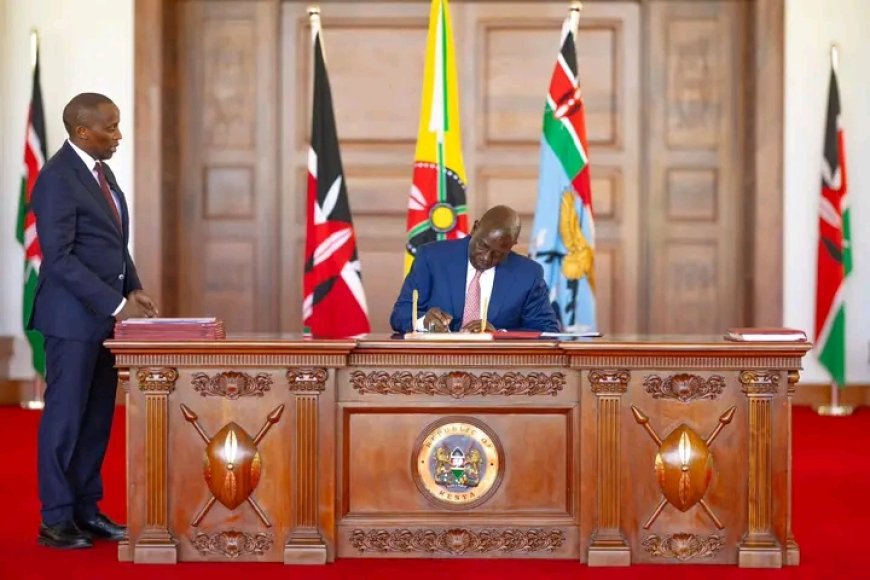Understanding Kenya's 2025 Tax Reforms: What they mean for you

Nairobi,
Wednesday, 8 January, 2025
McCreadie Andias
Taxes are a vital part of life, funding essential services like roads, schools, healthcare, and security. In 2024, Kenya underwent significant changes to its tax system, with new laws introduced to address the country’s economic challenges.
As 2025 begins, understanding these reforms is crucial for every Kenyan to navigate the new tax landscape effectively.
2024 was marked by economic turbulence, with rising inflation, mounting public debt, and increasing revenue pressures. The government introduced several reforms, from new levies to enhanced compliance measures, aimed at widening the tax base and increasing revenue collection.
For many Kenyans, these changes represent a heavier financial burden during a period of high living costs. But what exactly has changed, and how do these adjustments affect you?
Key Changes in Kenya’s Tax System
1. The Digital Service Tax (DST)
Kenya’s growing digital economy is now subject to the Digital Service Tax (DST).
What is DST?
A 1.5% tax on the value of digital transactions, targeting online services such as e-commerce, streaming platforms like Netflix, and digital advertising.
Impact on You:
While businesses are responsible for paying DST, the cost is often passed on to consumers through higher prices for digital services. Expect slight increases in subscription fees or other online services.
2. VAT Increase on Fuel
One of the most impactful changes was the increase in Value Added Tax (VAT) on fuel from 8% to 16%.
Daily Life Impact:
Higher matatu fares, increased grocery prices, and elevated costs for households with vehicles.
A surge in transportation costs has created ripple effects across the economy, affecting goods like farm produce and construction materials.
How to Cope:
Budget for higher transportation and energy expenses. Consider carpooling, using public transport, or cutting back on non-essential trips.
3. New Income Tax Rates for High Earners
The Pay-As-You-Earn (PAYE) rate for individuals earning over KSh 500,000 monthly increased to 35%.
Significance:
Targets the wealthiest Kenyans, generating substantial revenue.
Middle-income earners should review payslips regularly to ensure accurate deductions.
Compliance and Automation: eTIMS and Small Businesses
4. eTIMS Rollout
The Kenya Revenue Authority (KRA) introduced the Electronic Tax Invoice Management System (eTIMS) to streamline VAT compliance for businesses.
How it Works:
eTIMS ensures real-time invoice generation and reporting.
Impact on You:
Request electronic receipts when shopping to support compliant businesses and promote fair taxation.
5. Reverse Ticketing for Small Businesses
To address challenges faced by small businesses, reverse ticketing was introduced for businesses with a turnover below KSh 5 million. Buyers issue tax invoices to simplify compliance.
The Housing Levy: A Repealed Controversy
The Housing Levy, introduced at 1.5% of gross income to fund affordable housing projects, faced significant backlash and was repealed in mid-2024.
Why It Matters:
The levy’s repeal highlights the importance of public engagement in tax policymaking.
New Tax Laws Signed by President Ruto In December 2024, President William Ruto signed into law several bills, including:
The Tax Laws (Amendment) Act
- Replaced DST for multinational firms with a 6% Significant Economic Presence (SEP) tax.
- Increased the deductible mortgage interest limit from KSh 300,000 to KSh 360,000, encouraging homeownership.
- Introduced tax exemptions for locally assembled electric vehicles and pension benefits.
- Reduced the Capital Gains Tax (CGT) to 5% for firms certified by the Nairobi International Finance Centre Authority.
The Tax Procedures (Amendment) Act
- Clarified requirements for electronic tax invoices, including essential details like supplier PINs and purchaser information.
- Reintroduced import duties on certain raw materials to protect local steel manufacturers and boost the construction industry.
The Business Laws (Amendment) and KRA (Amendment) Acts
- Simplified business registration and compliance processes.
- Empowered the Kenya Revenue Authority with additional tools to enforce compliance.
Navigating 2025’s Tax Reforms
Taxes are a necessary part of nation-building, but they can feel overwhelming during tough economic times. Here’s how to stay ahead:
Stay Informed: Regularly review government announcements and tax updates.
Plan Ahead: Adjust your budget to account for higher costs of living, especially transportation and energy.
Seek Guidance: Consult tax professionals or use resources provided by the KRA for clarity on compliance.
With proactive planning and an understanding of these reforms, you can adapt to Kenya’s evolving tax landscape while contributing to a stronger nation.
What's Your Reaction?



































































































































































































































































































